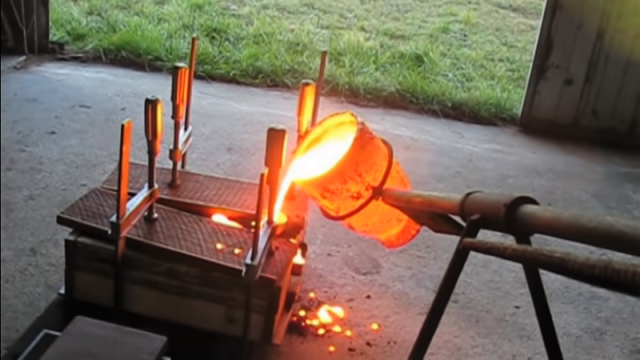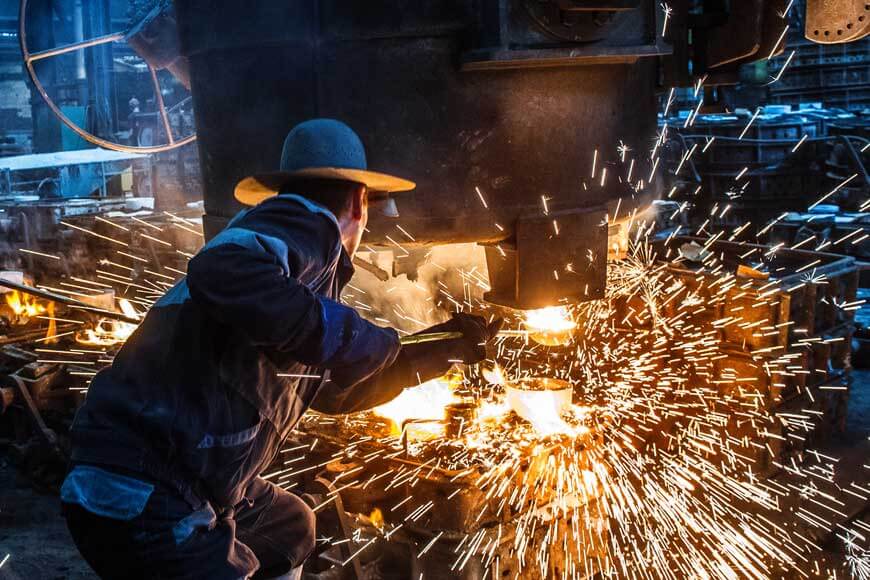Understanding the Art of Aluminum Casting for Efficiency
Wiki Article
A Comprehensive Guide to Metal Casting: Advantages and Services Supplied by Foundries
Metal casting is a vital procedure in different industries, supplying many benefits via the services of factories. These centers change liquified metal right into sturdy and specific components, satisfying details client requirements. By utilizing innovative innovations, shops guarantee quality and performance in production. However, the complexities of metal casting and the varied strategies involved raise vital inquiries regarding its role in modern-day production. What advancements lie ahead in this necessary field?Recognizing the Metal Casting Process
The metal casting procedure is a basic method utilized in making to develop intricate forms and parts. This method includes putting molten metal into a mold designed to form the wanted item. The procedure begins with pattern development, which functions as a theme for the mold and mildew. Metal Casting. Numerous materials, such as sand, metal, or ceramic, are used for mold-making, depending on the details needs of the casting
As soon as the mold is prepared, liquified metal is poured into it and permitted to cool and strengthen. After solidification, the mold and mildew is eliminated, revealing the actors part. Numerous techniques, consisting of sand casting, investment casting, and pass away casting, are used, each fit to various applications and materials. Quality control steps, such as assessments and testing, are vital to ensure the end product satisfies specifications. On the whole, the metal casting process plays an important role in creating components for markets ranging from vehicle to aerospace.
Trick Conveniences of Metal Casting
Metal casting offers significant advantages that make it a recommended production method in various sectors. Its design versatility and precision permit elaborate shapes, while affordable mass production improves performance. Furthermore, the convenience and strength of materials made use of in casting contribute to the resilience of the end products.Layout Flexibility and Accuracy
Launching impressive layout adaptability and accuracy, metal casting permits designers and developers to develop detailed forms and attributes that would certainly be challenging or difficult to attain with various other manufacturing approaches. This ability makes it possible for the manufacturing of complex geometries, interior structures, and fine information that enhance product performance and aesthetic appeals. Additionally, different casting methods, such as sand casting, financial investment casting, and pass away casting, give more alternatives for customization, fitting diverse product properties and job demands. The versatility of molds permits adjustments during the design phase, improving the change from principle to end product. Eventually, metal casting stands out for its ability to provide high-precision parts, making it an important procedure in sectors varying from vehicle to aerospace and past.Economical Mass Production
Affordable automation stands as one of the key advantages of metal casting, allowing producers to produce large amounts of elements at a lower price per system. This performance arises from the capacity to create complex mold and mildews that can be recycled several times, considerably lowering setup and functional costs. In addition, metal casting processes, such as sand casting and pass away casting, permit high throughput, making it feasible to meet the needs of massive manufacturing runs. The reduced product waste and power consumption additionally enhance expense financial savings, making metal casting an attractive choice for sectors needing bulk parts. Generally, the affordable nature of metal casting settings it as a recommended method for makers going for economic performance in their production procedures.Material Adaptability and Stamina
Among the standout qualities of metal casting is its amazing product adaptability, which enables for using a vast array of metals and alloys. This adaptability allows manufacturers to select materials that best suit their specific applications, from light weight aluminum and bronze to iron and steel. Each metal offers distinct residential properties, consisting of varying levels of stamina, rust resistance, and thermal conductivity. Subsequently, metal casting can generate elements that satisfy strict efficiency requirements across varied sectors, such as automotive, aerospace, and construction. In addition, the strength of cast metals can be improved with various therapy procedures, guaranteeing resilience and longevity. Aluminum Foundry. Generally, the combination of material convenience and intrinsic stamina makes metal casting a preferred selection for creating high-grade elementsSorts Of Metal Casting Strategies
Metal casting includes a variety of strategies that accommodate different manufacturing needs and product residential properties. Typical methods include sand casting, which makes use of a sand mold and mildew for intricate forms, and investment casting, recognized for its accuracy and surface finish. Die casting is one more method that utilizes high-pressure shot of molten metal into mold and mildews, suitable for automation of little parts.Covering molding uses a much faster different, making use of a resin-coated sand to develop thin-walled mold and mildews, while shed foam casting enables for intricate layouts without the requirement for a core.
Additionally, continual casting is used for generating long sections of metal, such as sheets or bars, by solidifying molten metal in a continuous process. Each method is and presents unique benefits chosen based upon factors like the needed detail, manufacturing volume, and product type, guaranteeing premium outcomes in metal manufacture throughout numerous industries.
The Duty of Foundries in Metal Casting
Factories play a critical function in the metal casting procedure, offering as the centers where molten metal is transformed into completed items. These specialized facilities are outfitted with the essential tools and innovations to take care of different steels, ensuring high-grade outcomes. Factories are in charge of numerous essential features, consisting of thawing the metal, putting it right into mold and mildews, and permitting it to strengthen.In addition, they keep rigorous safety and security and ecological criteria to secure employees and minimize environmental influence. Skilled service technicians and designers work together to maximize casting processes, improving efficiency and minimizing waste. Shops additionally engage in high quality control actions, guaranteeing that the end products meet specific tolerances and specs. This quality control is crucial for industries that rely on specific components, such as vehicle and aerospace. Consequently, shops contribute substantially to the general production landscape, enabling development and growth throughout different sectors.
Custom-made Metal Casting Solutions
Customized metal casting solutions offer tailored style services that meet specific customer needs. These solutions additionally provide material option experience, ensuring the best metal is selected for the desired application. Such flexibility and knowledge boost the general quality and performance of the end product.
Tailored Design Solutions
Tailored style options in metal casting supply makers with the adaptability to create components that meet specific performance and aesthetic requirements. Factories supply personalized solutions that enable customers to specify dimensions, forms, and surface area coatings to achieve preferred results. This personalization process commonly consists of partnership between developers and engineers, guaranteeing that the end products straighten with operational needs and sector requirements. Advanced technologies, such as computer-aided layout (CAD) and simulation software program, enable precise modeling and screening of parts prior to manufacturing, lessening errors and improving effectiveness. By leveraging tailored design remedies, businesses can maximize functionality while lowering waste and costs, inevitably leading to an extra competitive side in the marketplace. This adaptability is necessary for markets calling for distinct applications and requirements.Product Selection Expertise
When picking materials for metal casting, know-how plays a vital role in making certain that the best option lines up with both efficiency demands and cost-effectiveness. Factories use knowledgeable experts that recognize the residential properties of different metals and alloys, permitting them to advise optimal products for particular applications. Aspects such as toughness, corrosion resistance, and thermal conductivity are very carefully taken into consideration to meet the client's demands. In addition, industry patterns and innovations in product scientific research educate these choices, enabling foundries to stay affordable. By leveraging their expertise, foundries can help clients in guiding with facility product alternatives, eventually leading to enhanced item high quality and reduced production costs. This customized knowledge is crucial for achieving successful end results in custom metal casting services.High Quality Control in Metal Casting
Quality control in metal casting is important to ensure that the final items satisfy the called for specifications and efficiency requirements. Foundries utilize a range of techniques and techniques to guarantee the finest of cast components. This procedure starts with stringent product evaluations, verifying that raw materials abide by sector standards. Throughout the casting process, real-time tracking and screening are Aluminum Casting conducted to evaluate parameters such as temperature level, mold integrity, and dimensional accuracy.
Applications of Metal Castings Across Industries
Metal spreadings play an important function in numerous sectors, acting as the backbone for plenty of applications. In the vehicle sector, cast elements such as engine blocks and transmission real estates are required for car performance and dependability. The aerospace industry counts on accuracy spreadings for essential parts that assure safety and security and efficiency in trip. Additionally, the construction industry makes use of metal spreadings for components, installations, and architectural elements, boosting the sturdiness of structures and framework.Moreover, the power industry advantages from castings utilized in turbine blades and various other equipment essential for power generation - Aluminum Casting. The clinical area additionally makes use of metal spreadings in instruments and gadgets, showing the adaptability of this manufacturing procedure. In general, metal castings are indispensable to the capability and innovation of diverse sectors, showcasing their relevance in contemporary innovation and facilities growth
Often Asked Inquiries
What Products Are Typically Used in Metal Casting?
Usual materials utilized in metal casting consist of aluminum, iron, steel, bronze, and brass. Each product provides one-of-a-kind homes ideal for various applications, permitting manufacturers to choose the finest option based on toughness, rust, and weight resistance.For how long Does the Metal Casting Refine Commonly Take?
The metal casting procedure commonly takes several hours to a few days, depending upon aspects such as the intricacy of the layout, kind of metal used, and the particular casting technique utilized by the factory.
What Is the Ecological Influence of Metal Casting?
The ecological influence of metal casting consists of energy consumption, emissions, and waste generation. Foundries usually implement actions to reduce these results, such as recycling products and using cleaner innovations to lower their environmental impact.Can Metal Casting Be Done for Small-Scale Projects?
Metal casting can undoubtedly be done for small tasks. Various foundries satisfy such needs, offering personalized options that suit limited manufacturing runs while keeping high quality and accuracy in the end products.What Are the Safety And Security Actions in Metal Casting Foundries?
In metal casting shops, precaution consist of personal protective tools, appropriate ventilation, training on devices use, emergency procedures, normal maintenance checks, and adherence to industry safety and security standards to minimize threats connected with molten metal and hazardous materials.Additionally, metal casting procedures, such as sand casting and die casting, allow for high throughput, making it practical to meet the demands of massive production runs. One of the standout attributes of metal casting is its impressive product versatility, which allows for the use of a broad range of alloys and metals. In addition, continual casting is used for producing lengthy sections of metal, such as bars or sheets, by strengthening molten metal in a continual process. Factories play an essential duty in the metal casting procedure, offering as the facilities where molten metal is transformed into finished items. Common products made use of in metal casting consist of light weight aluminum, iron, steel, brass, and bronze.
Report this wiki page